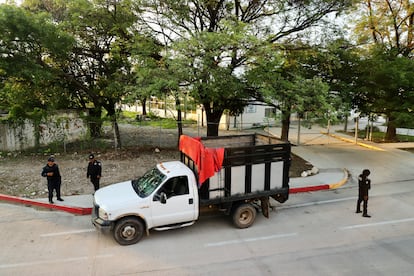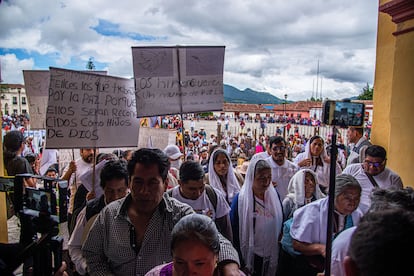Chiapas: a paradise for tourists, but an enclave of violence for residents
The day after being named a ‘magical town’ by Mexico’s Ministry of Tourism, a criminal group kidnapped 16 public officials in Ocozocoautla. This small town illustrates the contrasts that exist in the country’s southernmost state, which is experiencing a wave of violence


Ocozocoautla is a small corner of the southernmost Mexican state of Chiapas, distinguished by its impressive waterfalls, its sparkling rivers and its mountains and forests, all rich in biodiversity. It’s a splendid place to spend the holidays, while enjoying good food and hiking through exuberant nature. Known as Coita by the locals, the municipality was declared to be a “magical town” by the Ministry of Tourism last Monday.
Unfortunately, the very next day, a criminal group kidnapped 16 public officials on the road that leads to the town, where checkpoints – set up by organized crime – are common. While the recent award puts the town in the crosshairs of national and international tourism, the inhabitants of the area haven’t invited their family and friends to visit them for months. The region is besieged by violence.
Alejandra is the pseudonym for a young woman from Ocozocoautla, who now lives forty minutes from there, in Tuxtla. “Wherever you go, you always have to be careful, leave early and always return before dark,” she warns. Before taking a trip, check Facebook to see if the road you have to go through isn’t blocked by any organized crime checkpoints. In Coita, the drug traffickers operate freely. “There are almost always confrontations. At the entrances [of the town] are the large houses of the drug traffickers… the entire area is militarized, but the National Guard does nothing.” Her sister – who is also on the other end of the phone, speaking with EL PAÍS – says that things have only gotten worse in the last year. Last week, personnel from the Jalisco Nueva Generación Cartel went to her place of work to ask for “the quota.”
“They want 7,000 pesos a month and, if you don’t hand it over, they threaten to make you or your family disappear.”
“And are you going to pay?”
“Of course, there’s no other option.”
The situation faced by Alejandra and her family is common across the rest of the magical towns of Chiapas, as in many other tourist enclaves in Mexico. Two months ago, San Cristóbal de las Casas – a Chiapas city characterized by its colonial architecture and millennial history – experienced a street shooting. Artisan Jerónimo Ruiz – leader of the Association of Traditional Market Tenants of Chiapas – was murdered. The escalation of deaths and disappearances in the state – along with the muted response from the authorities – has sparked complaints even from the religious authorities. Bishop Luis Manuel López officiated a mass this past Wednesday, where social organizations, families of the disappeared and political prisoners, as well as citizens displaced by organized crime demonstrated against violence.

“The people cannot find an answer… there’s a very terrible vacuum of authority, a very big vacuum. A lot of pain. The people don’t know where to turn,” the bishop read, from the pulpit of the church.
A criminal group attacked local police in the Chiapa de Corzo municipality – another magical town in Chiapas – back in April. The officers managed to hide and repel the attack, according to a local newspaper, El Heraldo de Chiapas. Meanwhile, a new armed group emerged this week in Pantelhó, a small town in the state. With their faces covered and long weapons slung over their shoulders, they said they had come to restore peace and justice in the territory.
The Fray Bartolomé de las Casas Human Rights Center (Frayba) recently published a report titled Chiapas: A Disaster. “The diversification and opacity of armed groups [in Chiapas] that use violence for social, political, economic, and territorial control – marked by the impunity fostered by state actors – contributes to dispossession, exploitation, and social marginalization,” the report states.
The contrast between the different realities is brutal. The arbitrariness of the bullets and the kidnappings are intermingled with TV and online ads that promote Chiapas as a paradise on Earth. Ernesto López Portillo – coordinator of the Citizen Security Program at the
Ibero-American University in Mexico City – has a somewhat hopeless theory: the problem is that violence doesn’t really stop tourism. “[The tourists] have nothing to do with it – tourism works even where there’s violence. We have to stop thinking that tourism only occurs in safe places.” Despite the reports of deaths that arise during each holiday season in the main tourist cities of the country – Acapulco, Cancun, Playa del Carmen – people continue to fill hotels en masse. “Tourism continues to generate money and the state loses the economic incentive to act and stop the violence,” the expert explains by phone. “We’re learning that it’s not necessary to be safe. Criminology had predicted that violence would slow down economic activity, but we’re seeing that this isn’t the case. It’s very serious.”
Although this is the reality in the great tourist poles of Mexico, in the less touristy regions – where violence does impact tourism – Alejandra hasn’t been able to show Chiapas to her family and friends for a long time. “Here, the narcos do whatever they want. The towns are left without tourism and the people who lived from it have had to move. Even so, they continue to promote Chiapas… but the issues of violence haven’t been addressed,” says the young woman, from her new home in Tuxtla.
In the past, there was a kind of unwritten rule that criminals didn’t touch tourists. However, this doesn’t seem to apply anymore. The Chiapas Ministry of Tourism has refused to answer questions from EL PAÍS about the strange dichotomy between trying to make a state the capital of tourism in Mexico, while one of its armed groups – the Zapatista Army of National Liberation (EZLN) – is threatening a civil war if the attacks by the narcos don’t stop.
“Since I was a child, I felt proud of my state,” Alejandra laments. “It was nice to show off the vegetation, the coffee… what you wanted most was to show people from outside what we had here. Now it’s disappointing to know that I cannot invite you, because I cannot guarantee that you will be safe. It’s very sad, because Chiapas has enormous potential, beautiful beaches. But I have to tell my relatives not to come.”
“Have you thought about leaving the state?”
“Leaving Chiapas? No, we haven’t gotten to that point yet.”
Sign up for our weekly newsletter to get more English-language news coverage from EL PAÍS USA Edition
Tu suscripción se está usando en otro dispositivo
¿Quieres añadir otro usuario a tu suscripción?
Si continúas leyendo en este dispositivo, no se podrá leer en el otro.
FlechaTu suscripción se está usando en otro dispositivo y solo puedes acceder a EL PAÍS desde un dispositivo a la vez.
Si quieres compartir tu cuenta, cambia tu suscripción a la modalidad Premium, así podrás añadir otro usuario. Cada uno accederá con su propia cuenta de email, lo que os permitirá personalizar vuestra experiencia en EL PAÍS.
¿Tienes una suscripción de empresa? Accede aquí para contratar más cuentas.
En el caso de no saber quién está usando tu cuenta, te recomendamos cambiar tu contraseña aquí.
Si decides continuar compartiendo tu cuenta, este mensaje se mostrará en tu dispositivo y en el de la otra persona que está usando tu cuenta de forma indefinida, afectando a tu experiencia de lectura. Puedes consultar aquí los términos y condiciones de la suscripción digital.








































